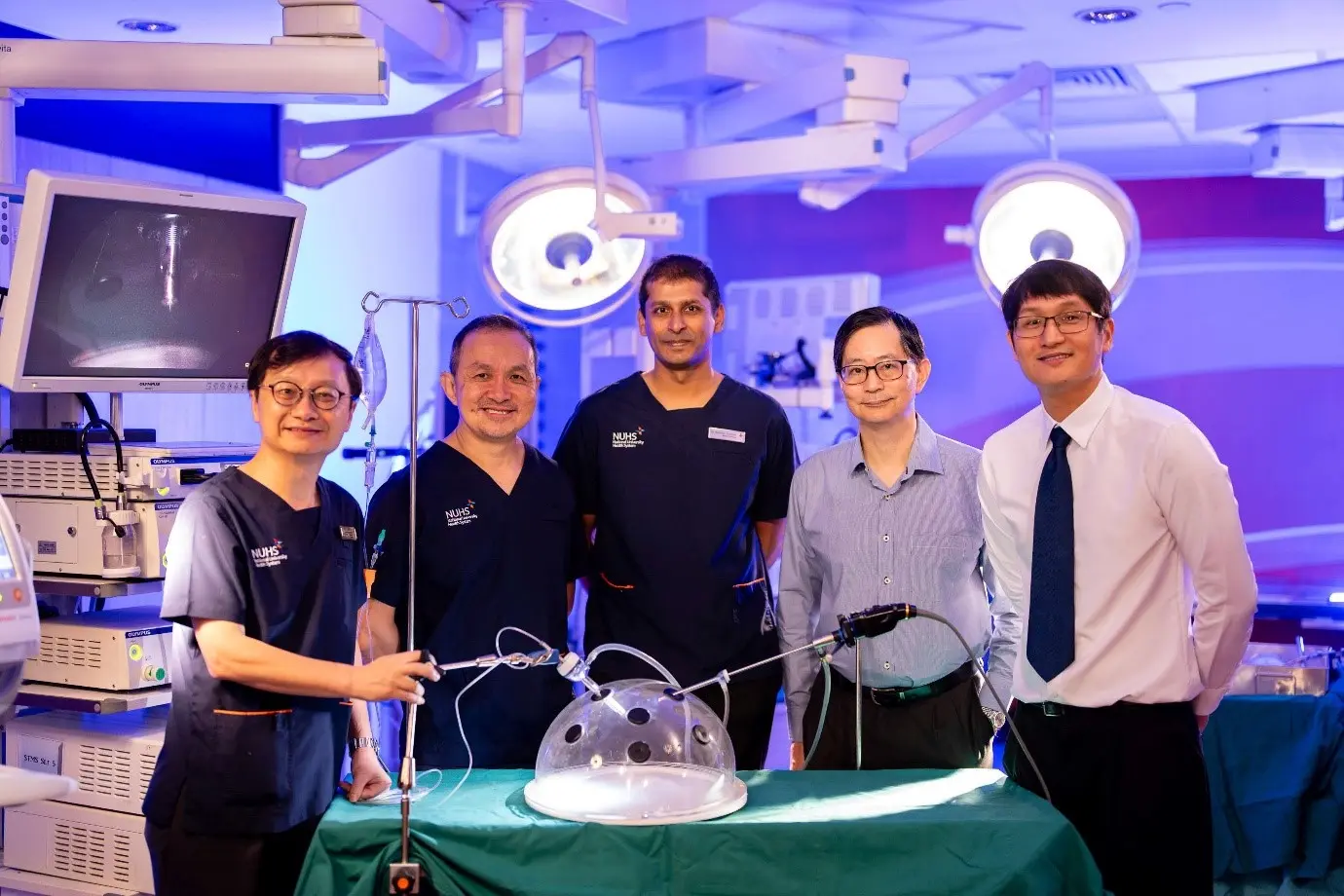Breakthrough research extends hope for gastric cancer patients with peritoneal metastasis
Published: 10 Sep 2024

From left: Prof Jimmy So, Dr Yong Wei Peng, Assoc Prof Raghav Sundar, Prof Patrick Tan, and Assoc Prof Johnny Ong, clinicians and scientists from the team. (Credit: NUHS)
Gastric cancer remains a formidable adversary, ranking as the fifth most common cancer and the third-leading cause of cancer-related deaths worldwide, with over 1,000,000 new cases and close to 770,000 deaths each year. In Singapore, gastric cancer ranks among the top 10 causes of cancer-related deaths and claims about 300 lives each year.
The peritoneum, the lining of the abdominal cavity, is frequently involved in advanced stage cancers, including gastric, colon, pancreatic, and ovarian cancers. For gastric cancer, the peritoneum is, in fact, the most common site of metastasis, both before and after treatments. Patients with gastric cancer peritoneal metastases (GCPM) often face an exceptionally grim prognosis, with severe symptoms and rapid disease progression. Median survival rates range from just three to six months, and five-year survival rates are usually below five percent. Therapeutic options are currently limited.
In a major breakthrough, clinicians and scientists from Singapore have shed light on the intricate mechanisms behind the spread of gastric cancer to the peritoneum. This landmark research, published in the prestigious journal Gastroenterology, offers renewed hope for patients battling this aggressive form of cancer. The scientists also conducted a clinical trial, published in another journal ESMO Open, demonstrating the safety and potential of a novel treatment approach for the disease.
The research study, spearheaded by a team of clinicians and scientists from the National University Hospital (NUH), the National University Cancer Institute, Singapore (NCIS), the Yong Loo Lin School of Medicine, National University of Singapore (NUS Medicine), the National Cancer Centre Singapore (NCCS), and Duke-NUS Medical School, utilised cutting-edge genomic and transcriptomic technologies to analyse a vast collection of patient samples. This in-depth analysis has provided an unparalleled understanding of the molecular underpinnings of gastric cancer peritoneal spread.
Associate Professor Raghav Sundar, NUS Medicine, who led the study published in Gastroenterology, emphasised: “Our research has pulled back the curtain on the complex biological processes that drive the spread of gastric cancer to the peritoneum. These findings provide a crucial roadmap for developing more effective and targeted treatments for this devastating disease.” A/Prof Sundar is also a Senior Consultant in the Department of Haematology-Oncology at NCIS.
“The PIANO trial results are incredibly encouraging, demonstrating the potential of combining targeted therapy like Pressurised Intra-Peritoneal Aerosol Chemotherapy (PIPAC) with immunotherapy to improve outcomes for patients,” said Professor Jimmy So, Professor of Surgery at NUS Medicine, who led the PIANO trial. “This approach could revolutionise the treatment landscape for this challenging condition.” Professor So is also Head & Senior Consultant, Division of Surgical Oncology, at NCIS, and Senior Consultant and Head of the Division of General Surgery (Upper Gastrointestinal Surgery) at NUH.
The combined research endeavours mark a significant leap forward in the fight against GCPM. The identification of predictive biomarkers and therapeutic targets could lead to the development of personalised treatment strategies, tailoring treatments to the unique molecular profile of each patient’s tumour. The success of the PIANO trial heralds a new era of combination therapies that leverage the power of the immune system to combat peritoneal metastases.
Read more in the press release here.

